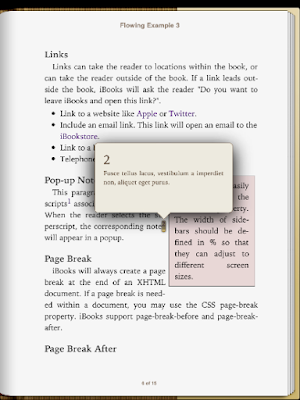Pop-up Footnotes

In EPUB 3 Flowing and Fixed Layout books, you can create pop-up footnotes by labeling footnotes with the appropriate epub:type values. You use two elements to create a pop-up footnote: an anchor ( <a> ) element that triggers the popup and the <aside> element that contains the footnote text. Both elements have an epub:type attribute to identify their purpose: epub:type="noteref" to trigger the popup and epub:type="footnote" to indicate the footnote’s text. In the example below, the anchor element ( <a> ) has two attributes: epub:type="noteref" and a link that references the location of the element that contains the popup's text. The <aside> element that contains the popup's text also has two attributes: id="myNote" that matches the value of the href attribute in the link that references it epub:type="footnote" Because the <aside> element has an epub:type of footnote , the text is ...
